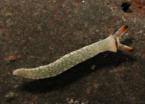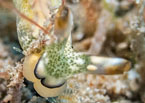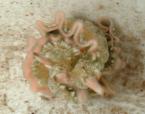| Home |
| Acknowledgments |
| Conventions |
| Glossary |
| Maps |
| References |
| Links |
| Articles |
| Thumbnails |
| Species
list |
| Family |
| Next
species |
Additional Photos
parapodia

underside

front

light

young

mating
egg mass
_______________
GALLERY

Thuridilla carlsoni Gosliner, 1995

| Maximum size: 25 mm. Identification: This is a relatively cryptic species with low parapodia that meet at the mid-line without major folds. It may be distinguished by the "leopard-like" pattern of green spots and peach colored marginal band on the exterior of its parapodia as well as by the lime-green veins on the interior of its parapodia. (Note 1) Natural history: Thuridilla carlsoni is a common plakobranchid found on shallow rocky bottoms. It usually occurs in protected to moderately exposed locations at depths of 1-3 m (3-10 ft). However, David Rolla recently found one at about 15 m (50 ft). Mature animals are diurnally active. The egg mass is a moderately to tightly coiled, cream spiral. A variable number of cream to pale orange longitudinal lines of superficial pigment may be present on the ribbon (usually visible only under magnification). The eggs hatch in about six days in the laboratory. Distribution: Big Island, Maui, Oahu and Kauai: widely distributed in the western & central Pacific. Taxonomic notes: It was first recorded in Hawaii from Oahu by Scott Johnson in the 1980s and was named after naturalist Clay Carlson who first found the species in Guam. Photo: CP: 25 mm: Hekili Point, Maui; Oct. 16, 2004. Observations and comments: Note 1: Perhaps, variation in the color of the the green spots results from differences in diet or chloroplast retention? |
| Thumbnails |
Species
list |
Family | Next species | Top |